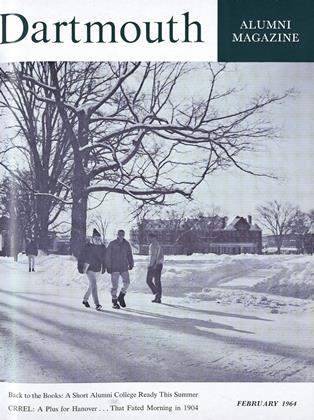The schedule for the winter term Great Issues lectures picks up the theme of President Dickey's "A Taste for Change" convocation address. The first of three parts, all January lectures, was titled "The United States in a Changing World" and featured addresses by Arthur Larson, former Director of the U. S. Information Agency and now Director of the World Peace through Law Center at Duke University; Alfred C. Neal, President of the Committee for Economic Development; and Thomas Schelling of Harvard's Center for International Affairs and author of The Strategy of Conflict.
Part II deals with the "Change in the International System" and is itself subdivided into three parts. In the first subdivision, "The Emergent Nations," PaulMarc Henry, Deputy Director, Bureau of Operations, United Nations Special Fund, spoke January 27, on economic and social development; and William Bundy, Assistant Secretary of Defense for International Security Affairs, will speak February 3 on dealing with political and military instability in the emergent nations.
In the second subdivision, dealing with "Communism," Vladimir Dedijer, a former member of the Yugoslav Government and ,a member of that country's UN delegation, 1945 to 1954, will give his view of the state of Communism in Eastern Europe. Zbigniew Brzezinski, Director of the Institute of Communist Affairs, Columbia University, follows with a discussion of the Sino-Soviet split.
The third subdivision is concerned with "The Atlantic Community" and opens with a talk by Pierre Mendes—France, former French Premier. The second speaker in this area of study is Dartmouth Professor Henry Ehrmann on "European Unity: Its Uses and Limits."
The winter term Great Issues program ends with a study of "The United States and International Change" and features a lecture by Sidney Hook, Professor of Philosophy at New York University. Professor Hook will speak on the question: "How Are the Pressures of World Involvement Straining American Democracy?"
 View Full Issue
View Full Issue
More From This Issue
-
 Feature
FeatureThe Fated Morning
February 1964 By HAROLD F. BRAMAN '21 -
 Feature
FeatureBACK TO THE BOOKS
February 1964 By R.J.B. -
 Feature
FeatureThe Cold, Cold World of CRREL
February 1964 By CLIFFORD L. JORDAN '45 -
 Feature
Feature$44,180,240 and How It Grew
February 1964 By FORD H. WHELDEN '25 -
 Article
ArticleTHE UNDERGRADUATE CHAIR
February 1964 By DAVE BOLDT '63 -
 Class Notes
Class Notes1936
February 1964 By BARRY C. SULLIVAN, E. JAMES STEPHENS JR.







